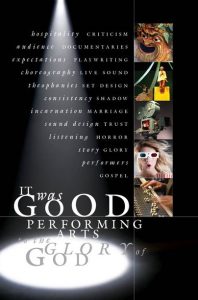It Was Good: Performing Arts to the Glory of God (Ned Bustard, 2018)

Performing to God’s Glory
I do not mean to be peremptory or presumptuous, but there is a series of three books you really should own and read and reflect on and discuss with friends. If it seems bold for me to say this, so be it. Each is a compendium of essays, so each chapter is by a different author, someone carefully chosen because they have something to say to the topic they were assigned. All three books are about the arts, and explore human creativity and imagination so that artists can be encouraged to embrace their calling with excellence and so that non-artists can better understand the creative process and so see past the surface of things in order to better appreciate what makes art, art. The three books are these:
It Was Good: Making Art to the Glory of God (2006)
It Was Good: Making Music to the Glory of God (2013)
It Was Good: Performing Arts to the Glory of God (2018)
The series is from Square Halo Books, and I hope you’ll read all three. I’ve already reviewed the first two, and want to recommend the third, on the performing arts, here.
In each volume I’ve learned by listening to artists whose expertise I appreciate as a viewer or listener but whose skill and work is something I can barely fathom. One essay in this third volume that both charmed and taught me is the chapter on abstract dance by Elizabeth Dishman (www.dishmanandco.org)
In Him we live and move and have our being
Dear Reader,
I think it’s time we got this out in the open… the part about me being an abstract choreographer. I know, what I do is weird. It’s okay that you didn’t “get” my latest dance—when I asked how you liked it, your eyes seemed to freeze a little bit in their sockets. It’s not that you have a weak aesthetic sense—you’re reading this book, right? But you always say you’re so challenged, so mystified by abstract dance, so I thought I’d do us both a favor and start the conversation…
“But God spoke all things into creation,” you protest. You remind me that Adam’s first job was giving names to things, that the words and decrees of God are constantly being lifted up in Scripture. And you’re right—as Psalm l9 says:
The law of the Lord is perfect,
reviving the soul;
the testimony of the Lord is sure,
making wise the simple;
the precepts of the Lord are right,
rejoicing the heart:
the commandment of the Lord is pure,
enlightening the eyes.
But remember the beginning of this psalm?
The heavens declare the glory of God,
and the sky above proclaims his handiwork.
Day to day pours out speech,
and night to night reveals knowledge.
There is no speech, nor are there words,
whose voice is not heard.
Their voice goes out through all the earth,
and their words to the end of the world.
In them he has set a tent for the sun,
which comes out like a bridegroom leaving his chamber,
and, like a strong man, runs its course with joy.
Its rising is from the end of the heavens,
and its circuit to the end of them,
and there is nothing hidden from its heat.
The heavens declare, proclaim, reveal knowledge, without any words at all. And how do they do this? Heavenly bodies move across the sky, rising and setting in an amazing cosmic dance. How simple, how glorious! The psalmist knows that some things cannot exist fully in verbal form, and the apostle Paul agrees: “The Spirit himself intercedes for us with groanings too deep for words.” [p. 173-174]
The first time I read Dishman’s chapter I was so delighted—and challenged from Scripture on the topic—that I interrupted my reading to search for dance performances I could attend. I recommend It Was Good: Performing Arts to the Glory of God to you. And yes, I contributed the chapter on Story. I recommend that, too.

